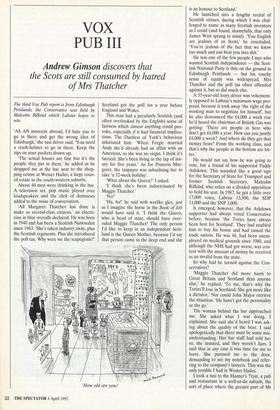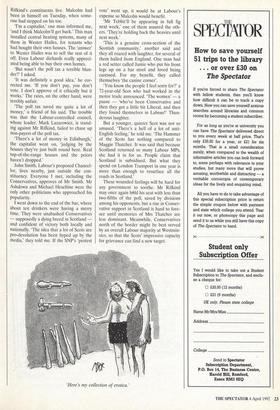VOX PUB III
Andrew Gimson discovers that the Scots are still consumed by hatred of Mrs Thatcher
The third Vox Pub report is from Edinburgh Pentlands, the Conservative seat held by Malcolm Rifkind which Labour hopes to win.
'AS AN innocent abroad, I'd hate you to go in there and get the wrong idea of Edinburgh,' the taxi driver said. 'You need a crash-helmet to go in there. Keep the zips on your pockets drawn up.
'The actual houses are fine but it's the people they put in them,' he added as he dropped me at the bar next to the shop- ping centre at Wester Hailes, a large coun- cil estate in the south-western suburbs.
About 40 men were drinking in the bar. A television set, pop music played over loudspeakers and the click of dominoes added to the noise of conversation.
'All Margaret Thatcher has done is make us second-class citizens,' an electri- cian in blue overalls declared. He was born in 1940 and has been a Scottish Nationalist since 1963. 'She's taken industry away, plus the Scottish regiments. Plus she introduced the poll tax. Why were we the scapegoats?' Scotland got the poll tax a year before England and Wales.
This man had a peculiarly Scottish (and often overlooked by the English) sense of fairness which almost anything could pro- voke, especially if it had financial implica- tions. The Duchess of York's behaviour infuriated him: 'When Fergie married Andy she'd already had an affair with an American, so she was no virgin. I think it's farcical. She's been living in the lap of lux- ury for five years.' As for Princess Mar- garet, the taxpayer was subsidising her to take 'a 52-week holiday'.
'What about the Queen?' I asked.
'I think she's been indoctrinated by Maggie Thatcher.'
'No!'
'Ha, ha!' he said with warlike glee, just as I imagine the horse in the Book of Job would have said it. 'I think the Queen, who is head of state, should have over- ruled Maggie Thatcher! The only person I'd like to keep in an independent Scot- land is the Queen Mother, because I'd say that person came in the deep end and she 'How old are you! is an honour to Scotland.'
He launched into a lengthy recital of Scottish virtues, during which I was chal- lenged to name as many Scottish inventors as I could (and found, shamefully, that only James Watt sprang to mind). 'You English are jealous of us Scots,' he concluded. 'You're jealous of the fact that we know too much and can beat you into shit.'
He was one of the few people I met who wanted Scottish independence — the Scot- tish National Party is thin on the ground in Edinburgh Pentlands — but his touchy sense of equity was widespread. Mrs Thatcher and the poll tax often offended against it, but so did much else.
A 55-year-old lorry driver was vehement- ly opposed to Labour's minimum wage pro- posal, because it took away 'the right of the working man to negotiate for himself, but he also denounced the £4,000 a week rise he'd heard the chairman of British Gas was getting: 'There are people in here who don't get £4,000 a year. How can you justify £4,000 a week? And where do they get that money from? From the working class, and that's why the people at the bottom are bit- ter.'
He would not say how he was going to vote, but a friend of his supported Paddy Ashdown. This sounded like a good sign for the Secretary of State for Transport and former Scottish Secretary, Malcolm Rifkind, who relies on a divided opposition to hold his seat. In 1987, he got a little over 17,000 votes, Labour 13,500, the SDP 11,000 and the SNP 3,000.
It emerged, however, that the Ashdown supporter had always voted Conservative before, because 'the Tories have always been best for Scotland'. They had enabled him to buy his house and had tamed the trade unions. He was 48, had been unem- ployed on medical grounds since 1980, and although the NHS had got worse, was con- tent with the amount of money he received as an invalid from the state.
So why had he turned against the Con- servatives?
'Maggie Thatcher did more harm to Great Britain and Scotland than anyone else,' he replied. 'To me, that's why the Tories'll lose in Scotland. She got more like a dictator.' Nor could John Major retrieve the situation: 'He hasn't got the personality or the go.'
The woman behind the bar approached me. She asked what I was doing. I explained. She said she'd heard I was ask- ing about the quality of the beer. I said apologetically that there must be some mis- understanding. Her bar staff had told her so, she insisted, and they weren't liars. I said that in any case it was time for me to leave. She pursued me to the door, demanding to see my notebook and refer- ring to the company's lawyers. This was the only trouble I had in Wester Hailes.
I took a taxi to the Hunter's Tryst, a pub and restaurant in a well-to-do suburb, the sort of place where the greater part of Mr Rifkind's constituents live. Malcolm had been in himself on Tuesday, when some- one had stepped on his toe.
'I'm a capitalist,' one man informed me, 'and I think Malcolm'll get back.' This man installed central heating systems, many of them in Wester Hailes, for tenants who had bought their own houses. The 'answer' to Wester Hailes was to sell the rest of it off. Even Labour diehards really appreci- ated being able to buy their own homes.
'But wasn't the poll tax a terrible blun- der?' I asked.
'It was definitely a good idea,' he cor- rected me. 'If you don't pay, you don't vote. I don't approve of it ethically but it works.' The rates, on the other hand, were terribly unfair.
'The poll tax saved me quite a lot of money,' a friend of his said. The trouble was that the Labour-controlled council, whose leader, Mark Lazarowicz, is stand- ing against Mr Rifkind, failed to chase up non-payers of the poll tax.
'There's a lot of money in Edinburgh,' the capitalist went on, 'judging by the houses they've just built round here. Real top-of-the-range houses and the prices haven't dropped.'
John Smith, Labour's proposed Chancel- lor, lives nearby, just outside the con- stituency. Everyone I met, including the Conservatives, approves of Mr Smith. Mr Ashdown and Michael Heseltine were the only other politicians who approached his popularity.
I went down to the end of the bar, where about ten drinkers were having a merry time. They were unabashed Conservatives — supposedly a dying breed in Scotland and confident of victory both locally and nationally. 'The idea that a lot of Scots are pro-devolution has been hyped up by the media,' they told me. If the SNP's 'protest vote' went up, it would be at Labour's expense so Malcolm would benefit.
'Mr Tebbit'll be appearing in full fig next week,' one of them assured the oth- ers. 'They're holding back the heavies until next week.'
'This is a genuine cross-section of the Scottish community,' another said and they all roared with laughter, for several of them hailed from England. One man had a red setter called Jamie who put his front legs up on a bar stool and loved being caressed. For my benefit, they called themselves 'the canine corner'.
'You know the people I feel sorry for?' a 72-year-old Scot who had worked in the motor trade announced. 'The women' — a pause — 'who've been Conservative and then they got a little bit Liberal, and then they found themselves in Labour!' Thun- derous laughter.
But a younger, quieter Scot was not so amused. 'There's a hell of a lot of anti- English feeling,' he told me. 'The Hammer of the Scots has nothing compared to Maggie Thatcher. It was said that because Scotland returned so many Labour MPs, she had it in for us. People claim that Scotland is subsidised. But what they spend on London Transport in one year is more than enough to resurface all the roads in Scotland.'
These wounded feelings will be hard for any government to soothe. Mr Rifkind may once again held his seat with less than two-fifths of the poll, saved by divisions among his opponents, but a rise in Conser- vative support in Scotland is hard to fore- see until memories of Mrs Thatcher are less dominant. Meanwhile, Conservatives north of the border might be best served by an overall Labour majority at Westmin- ster, so that the Scots' impressive capacity for grievance can find a new target.
'Here's my collection of erotica.'



























































 Previous page
Previous page